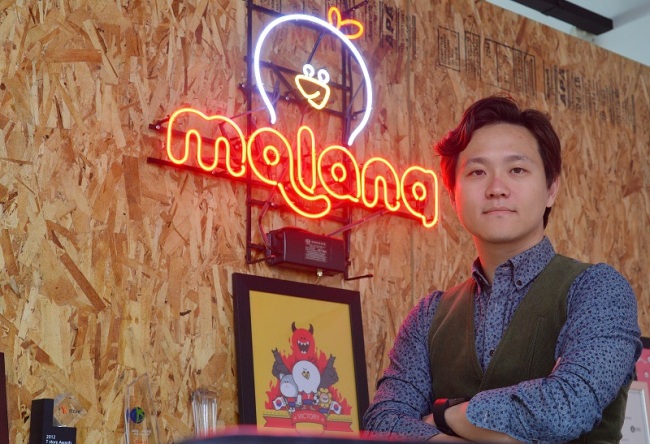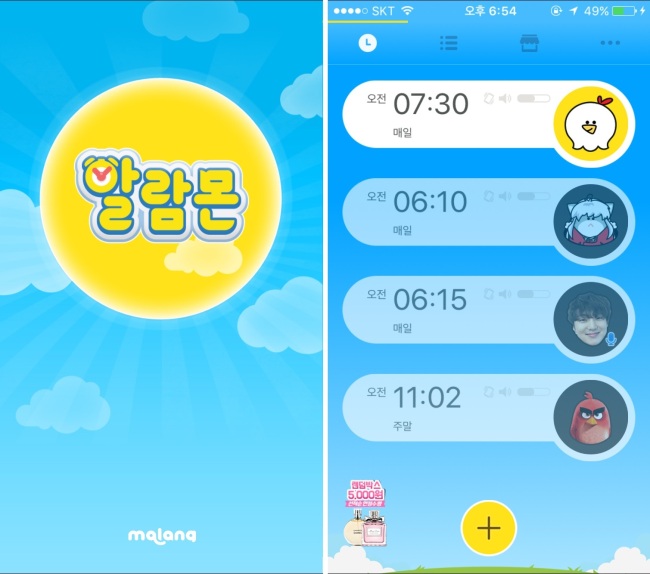[INTERVIEW] Lifestyle app-maker Malang Studio aims to make life easier
By KH디지털2Published : Sept. 27, 2016 - 18:08
[THE INVESTOR] You wake up to blaring music from the app AlarmMon, but you cannot stop it from ringing by simply hitting a button. Instead, you must play a short smartphone game that gets your brain rolling first thing in the morning.
Heading out the door, you find the fastest trains and the nearest exit to your destination via a few taps on the Subway Korea mobile app.
Back at home, you open the distance-based dating app 1Km, to connect with new people who live in your neighborhood. In the evening, you might use the Me.Time diary app to jot down the day’s thoughts and feelings.
Heading out the door, you find the fastest trains and the nearest exit to your destination via a few taps on the Subway Korea mobile app.
Back at home, you open the distance-based dating app 1Km, to connect with new people who live in your neighborhood. In the evening, you might use the Me.Time diary app to jot down the day’s thoughts and feelings.

All of these apps come from Malang Studio, a South Korean startup with a knack for developing lifestyle apps for daily use.
“Our goal is to target diverse time slots and physical spaces that a user experiences from the day’s start to finish,” Malang Studio founder and CEO Kim Yeong-ho said in an interview with The Korea Herald.
Formed in 2011 by a handful of student engineers and designers who sought to create useful services catered to smartphones, Malang’s core mission is to build software which is truly “malang,” which roughly translates to “soft” or “flexible” in Korean.
Since the breakthrough success of its flagship lifestyle app AlarmMon -- which currently has nearly 25 million users worldwide -- this five-year-old startup has been quickly expanding its portfolio of apps.
Malang was acquired by local mobile app aggregator Yello Mobile in 2014 and it now operates seven lifestyle apps, two of which were recently developed in partnership with Google and its new app development solution Firebase.

AlarmMon: waking up for a reason
While other apps developed by Malang have also been fairly successful, AlarmMon still stands at the center of the company's ad-driven business model and has served as a foundation for the firm’s foray into other lifestyle categories.
Kim and his team put together their first app based on a rather humble vision -- to build a user friendly app that could serve simple yet necessary functions, such as alarm clocks.
While remaining true to its fundamental function of waking people up, AlarmMon’s gaming component gives users a reason to get up -- whether it is to help an animated panda escape from prison or to feed a hungry lamb, as part of games.
“AlarmMon became an immediate hit in Korea upon its release, soaring to the top of the app store rankings just six months into its launch -- to our pleasant surprise,” Kim said.
As soon as the app became successful, the young startup immediately saw that it needed to secure overseas users to retain growth in the long run, Kim said.
AlarmMon’s first target destination was the US, where Malang was lucky enough to venture after scoring government funding and infrastructural support. However, the firm experienced a bitter failure after just three months in Silicon Valley.
“We thought all users worldwide would want alarms designed to ensure they can wake up in the morning. But that wasn’t necessarily the case in the US where lifestyle patterns are inherently different from those of Korea,” the Malang CEO said.
Kim discovered that many American college students and workers, most of whom own a car, led less rigid lifestyles compared to their Korean counterparts who are often pressed for time and bound to public transportation timetables.
In other words, AlarmMon -- an alarm app fundamentally designed to make sure that users are up and awake -- may not necessarily fit the general life patterns of American users, Kim said.
“After realizing that even a simplistic tool like an alarm clock is approached differently by different cultures, we decided to focus on launching AlarmMon in Asian countries with lifestyle patterns similar to those of Korea.”
Today, AlarmMon has an international presence across Asia, in countries such as Taiwan, China, Indonesia and Thailand. Targeting K-pop fans in the region, Malang recently began selling new sound alarms featuring the voices of popular K-pop celebrities.
“The new K-pop voice alarms have been generating meaningful sales, though their revenue contribution compared to in-app advertisements is small,” said the Malang CEO.
Close to users 24/7
Looking ahead, Malang Studio hopes to continue expanding its user pool by bringing existing apps like AlarmMon to new markets abroad, such as Latin America, and by creating new lifestyle apps that can be used at differing points in time throughout the day.
“We are always brainstorming new app ideas. We work on building apps that we think people might need, and abandon them if deemed otherwise. This process repeats until we introduce a new app to the public,” Kim said.
Kim’s long-term vision is to build new technological algorithms that can connect all of Malang’s lifestyle apps throughout the 24 hours of a day.
“Right now, our apps all function independently. However, in the future we’d like to build technology to link the apps together, so we can get a better idea of how our users spend their entire day. This will lead to more useful ads,” he said.
Meanwhile, the lifestyle app developer has been working on ad optimization algorithms of its own in partnership with companies such as Google and Facebook, and these will take effect starting next year.
Kim expects the new algorithms could more than triple the firm’s revenue from the current breakeven point of around 1 billion won ($899,300) to as much as 4 billion won by next year.
By Sohn Ji-young / The Korea Herald (jys@heraldcorp.com)







![[KH Explains] Hyundai's full hybrid edge to pay off amid slow transition to pure EVs](http://res.heraldm.com/phpwas/restmb_idxmake.php?idx=644&simg=/content/image/2024/04/18/20240418050645_0.jpg&u=20240419100350)






![[From the Scene] Monks, Buddhists hail return of remains of Buddhas](http://res.heraldm.com/phpwas/restmb_idxmake.php?idx=652&simg=/content/image/2024/04/19/20240419050617_0.jpg&u=20240419175937)

![[KH Explains] Hyundai's full hybrid edge to pay off amid slow transition to pure EVs](http://res.heraldm.com/phpwas/restmb_idxmake.php?idx=652&simg=/content/image/2024/04/18/20240418050645_0.jpg&u=20240419100350)

![[Today’s K-pop] Illit drops debut single remix](http://res.heraldm.com/phpwas/restmb_idxmake.php?idx=642&simg=/content/image/2024/04/19/20240419050612_0.jpg&u=)